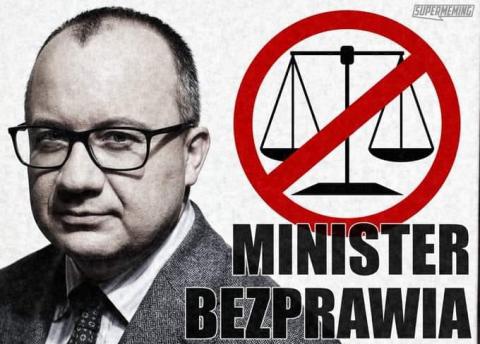
If anyone has forgotten, I remind you. Dr Adam Bodnar has served as Minister of Justice and lawyer General since 13 December 2023.
PDistrict rokuratura in Warsaw published on Tuesday the minutes of the proceeding as a witness of Barbara Skrzypek. So let's look at the first card.

The activity was not recorded? Why is that, Mr. Bodnar?
After all, in 2017 you wrote about the necessity of this in criminal proceedings, in all stage!
This entry is available on the Ombudsman’s website.
24 October 2017 and 30 November 2017 Adam Bodnar addressed the Minister with requests to extend the scope of the work to evidence the course of actions recorded in criminal proceedings. The aim is to guarantee the appropriate conduct of criminal proceedings and to guarantee that the court's ruling is based on correct findings.
Today, the Code of Criminal Procedure allows for the recording device to capture the image or sound of the recorded actions - which should be warned by those involved. Hearings of a witness or expert shall be recorded in case of concern that this will not be possible in further proceedings. An interrogation of the victim in sexual crimes is besides recorded.
In turn, Article 147 § 2b Kpk states that the course of the proceeding is recorded by means of a recording device, sound or sound - unless this is impossible for method reasons.
In the opinion of the RPO, the introduction of mandatory recording of recorded sound would lead to the anticipation to full reproduce the statements of witnesses at a further phase of criminal proceedings - if necessary.
Recording hearings in preparatory proceedings would reduce the hazard of violating the procedural rights of persons questioned (especially those who are without a lawyer or a representative), for example by limiting the anticipation of having an unauthorised influence on their content. This would besides defend public officers - police officers and prosecutors - from allegations of abuse of powers or misconduct.
On the another hand, recording appeals and cassation proceedings - in the course of which, in principle, no evidence is being conducted - would let a faithful reproduction of statements, positions and conclusions of the parties.
Although Article 147 § 2b Kpk provides that the rule is to evidence a trial, the wide-flung exception to this rule (the "technical impossibility") causes that recording is frequently not done. The ultimate Court accepted not recording trials as a form of principle; in 2018 no cassation proceeding was recorded.
The intention of the RPO is not to replace in criminal proceedings the conventional electronic protocol - as in civilian or criminal proceedings. The sound recording would only be an annex to the protocol, allowing to dispel any doubts as to its compatibility with the actual course of the process.
The RPO has not received an MS consequence in over 2 years. Meanwhile, in accordance with the Ombudsman's Act, the authorities of the State to which the RPO will address are obliged to respond to its general assessments, comments and opinions.
And as of 2017, the problem has not become obsolete. However, Kpk's changes since then have completely ignored this issue.
Therefore, Adam Bodnar again asked Minister Zbigniew Ziobry to respond to these demands.
]]>https://bip.brpo.gov.pl/en/content/rpo-recording-activity-investigation-i-p...]]>
Bodnar has been Minister and lawyer General for 16 months.
In the meantime, he had already appeared more than 7 years ago to be obliged to evidence any criminal action.
It seems that the introduction of recording should be 1 of his first orders, released before Christmas 2023!
Unfortunately. It's inactive the same.
Is this the case on purpose, due to the fact that ‘a fighting democracy’ requires a violation of the law, and recordings in this case would be evidence of a criminal offence of officers???
And, by all means, they would have caused so-called. freezing effect Even with the hottest praetorians of the fresh regime????????
19.03 2025
